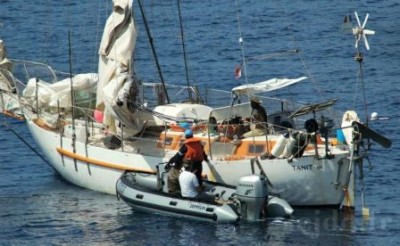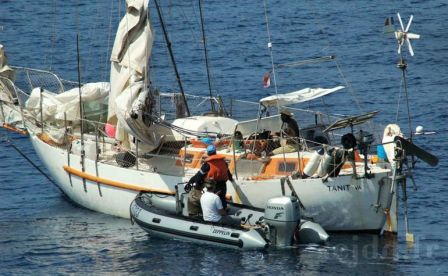The 3 Somali pirates of Tanit condemned. A slow record

(BRUSSELS2) The three pirates who captured the Tanit in April 2009 have just been sentenced to 9 years in prison by the Assize Court of Rennes (Ille-et-Vilaine). They were found guilty"hijacking of a ship by violence or threat, arrest, kidnapping, sequestration or arbitrary detention of several people including a minor under the age of 15, committed in an organized gang", as my colleague from Ouest-France in Rennes points out (read online article). This inspires me two types of reflection
First, thea France quick to act, slow to judge
It was time ! I wrote two years ago that France was red lantern for the judgment de pirates somali. This is confirmed today. While French military action was rapid and pioneering off Somalia, the judicial part of the trial was much slower, even extraordinarily slow. 1652 days, or 4 and a half years, between the release of the Tanit and the arrest of the three pirates and the judgment, we hold a record! Especially since the interested parties were caught red-handed: on the boat, no doubt about their involvement in one way or another in the hostage-taking.
4 and a half years old = World Champion
From memory, this judgment is even one of the longest in the history of piracy was the country that took the longest to pronounce a judgment in first instance on pirates captured in the Indian Ocean and repatriated to the country . Of course; nobody can match Puntland and its delays which have often been less than 100 days (sometimes in ten days!). But some countries prove that it is possible to judge quickly by respecting all the usual procedures imposed in a European country: example for the Pompeii trial. in Belgium, where the judgment was pronounced in 213 days. In general, we are around 500 days to wait for a judgment. Even in Germany, renowned for the rigor of these procedures (and the slowness of its courts), the trial of the MV Taipan was rendered after 928 days (according to the "piracy" database of B2). There is a real problem here. Obviously, we can argue that some countries bypass the subject, simply avoiding judging pirates (Denmark and the United Kingdom for example), this is not an excuse for such a snail race.
Second, theforce takeover action, justified...
The action of liberation by force was, once again, criticized during this judgment. Indeed, during this type of operation, there are risks. And when we redo the sequence of events afterwards, there is always a specialist to explain that we could have avoided such and such an incident. This is also the objective of feedback. I will not enter into this discussion, not having the necessary expertise.
Shared risks
What we do know, however. Is that this is not a blunder, where a person who had nothing to do is caught in the crossfire (what is called "a collateral victim"). But of a person who has knowingly exposed himself to a risk and for whom we have tried everything possible to save him. You have to remember the times. In the spring of 2009, the "ballad" aboard a yacht in the Indian Ocean at this time was already not a walk in the park. Somali piracy was booming, and pirates were in action everywhere: from the Gulf of Aden to the shores of the Seychelles. In the weeks preceding the taking of the Tanit, the attacks were daily and a boat was captured by the pirates, at least every 2 days! (*)
An obviously political decision
The decision taken by the President of the Republic at the time, Nicolas Sarkozy, is therefore justified, given the possible risks directly for the hostages and the repercussions on other ships afterwards. The experience suffered by the various sailors held hostage by the Somali pirates shows that there was no simple choice. The conditions of detention were, to say the least, harsh. Subjected to ill-treatment, which in some cases has even been likened to torture, some have died, others have been raped, most are scarred for life... especially not to forget it and to overwhelm the leaders who played their role of "politics" - to choose between two equally bad solutions: laissez-faire or to intervene - and the soldiers who carried out this order - by risking their lives.
A deterrent effect
This intervention, which caused 3 deaths (2 pirates and 1 hostage), added to that of the Carré d'As and the Ponant, certainly preserved other French hostages. Some pirates sometimes preferred to turn back when they saw the French flag. Those who doubt it should reread the account of the Chandlers, kidnapped in October 2009, collected by the Daily Mail daily upon their release. The first question from the pirates was "nationality, nationality"? (The Chandler Tale: Pirates Still Dread the Gauls!).
(*) My database even indicates 12 ships captured in the last 15 days of March! The capture of the Tanit dates from April 4.
Lire:

Sentenced to 9 years, after 4 and a half years of pre-trial detention (I imagine), they will therefore be released tomorrow (or thereabouts)?
Yes almost. The 9-year sentence is based on this preventive detention deal